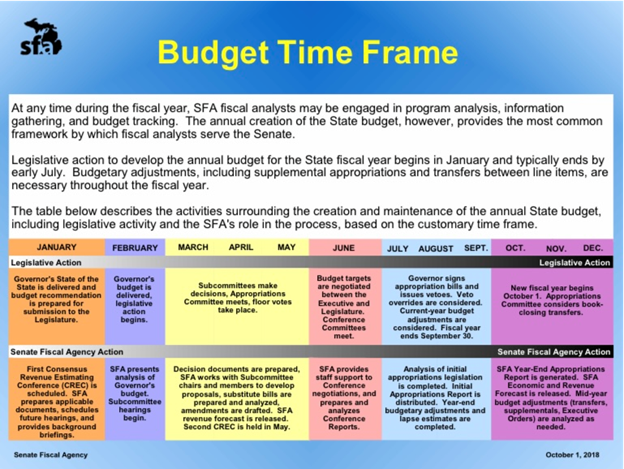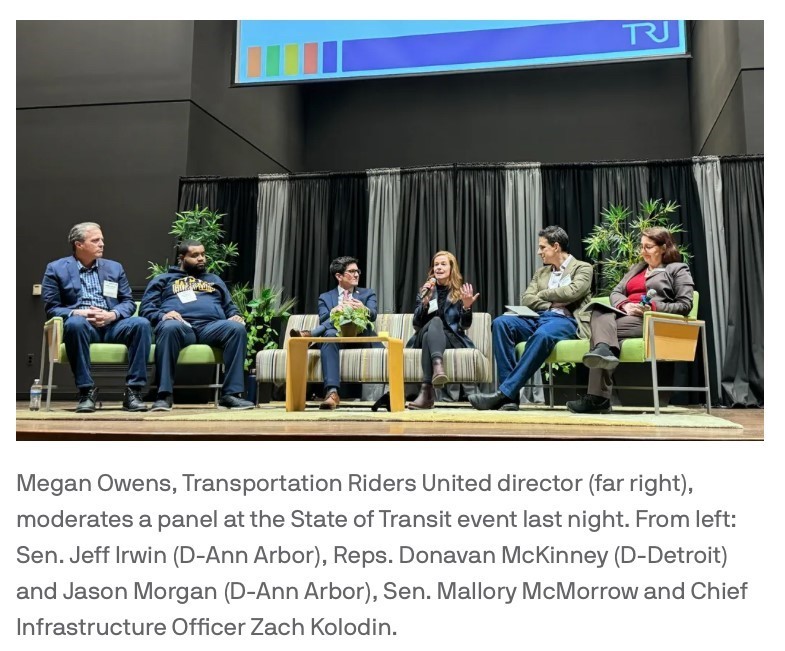February is Black History Month — an annual month-long celebration commemorating the accomplishments of African Americans and their pivotal contributions to the United States. There are plenty of ways to celebrate Black History Month in Michigan.
This week, Gov. Gretchen Whitmer presented her executive budget proposal to the joint House and Senate Appropriations Committees, of which I serve as a member. Following her annual State of the State address, the executive budget presentation is the Governor’s opportunity to present, in much more detail, her proposed state budget for the coming fiscal year. This kicks off the annual budget negotiation process. From here, the appropriations committees will begin meeting to debate the ideas that the Governor presented, discuss our own priorities, and work to pass budget bills that best serve the needs of all Michiganders in the coming year.
As always, if you want to share your views on legislation or budget priorities or need assistance, you can email us at senmmcmorrow@senate.michigan.gov or call (517) 373-2523.
Sincerely,

Mallory McMorrow
State Senator
District 8
Action In the Legislature
Governor Gretchen Whitmer Presents Executive Budget Recommendations
Governor Whitmer unveiled her executive budget recommendations this week for the Fiscal Year 2025-26. Each year, her recommendations outline her priorities for the state. During the presentation, her budget team pulled forward a number of recommendations from the Growing Michigan Together council report, including the creation of a new innovation fund to support start-ups and small businesses started right here in Michigan. However, the council report also specifically recommended significant investments in regional transit systems, which I did not see reflected in the presentation. I took the opportunity to ask if greater investment here was considered, especially as we consider a revised approach to economic development that focused on talent and community development rather than relying so heavily on incentives. You can see that exchange here.
Over the next few months, House and Senate appropriations committees will get to work developing budget bills that reflect the needs of all Michiganders. The legislature must present their final budget bills to the governor by July 1. She can veto specific items and the final budget must be signed by Oct. 1
To learn more about executive budget recommendations and the state budget process, click here.

Bills to Open the Governor and Legislature up to FOIA Receive First Hearing in Oversight Committee
Currently, Michigan is one of only two states that exempt the Governor and the legislature from allowing residents and journalists to request documents or information through the Freedom of Information Act. Unsurprisingly, that’s consistently led our state to rank as one of the worst in the country in government ethics and transparency. In 2015, a report from the Center for Public Integrity ranked Michigan dead-last nationwide. For the past 10 years, a bipartisan group of legislators has attempted to remedy this situation by introducing legislation to open up the Governor’s office and the legislature to FOIA, but over those 10 years under previous leadership, those bills were never granted a hearing.
That finally changed this week.
Senators Jeremy Moss (D) and Ed McBroom (R) presented their bills to the Senate Oversight Committee, on which I serve as Vice Chair. If passed, the bills would subject both the legislature and the Governor’s office to FOIA in the same way most other public offices and bodies are, allowing residents to file requests to view official correspondence such as emails or letters, or legislators’ official calendars. In his testimony, Senator McBroom noted that in the wake of a number of high-profile corruption scandals in recent years from the legislature, seeing a trend of a particular lobbyist meeting with a legislator more than a dozen times over a short period could provide crucial insight to hold those officials accountable.
One exemption currently written into the bills is constituent correspondence. Oftentimes, residents will reach out to our office with sensitive or urgent needs, and we’re frequently contacted as a last resort after efforts to resolve a matter elsewhere have failed. People may share very personal details with us, as well as documents and personal information that might help us resolve their matter, and I spoke in committee on my belief that constituents deserve to know this information is protected. The ACLU and others raised concerns about the scope of the exemption, so we will continue to work towards a solution that strikes the right balance of protecting sensitive constituent information while still ensuring the public has the ability to access information to shine a light on how and why legislators’ decisions are made.
Bills to Ban Firearms at Polling Places Receive First Hearing in Elections & Ethics Committee
Another committee I serve on — the Senate Elections & Ethics committee — took testimony on two House bills that would prohibit individuals from carrying firearms at polling places. Currently, only 11 states and Washington D.C. have clear prohibitions against firearms in polling places, including Ohio, Georgia, California, Arizona, Florida, and Texas. And while opponents of such bans often cite the U.S. Supreme Court’s Bruen decision which broadly affirmed the rights of individuals to carry a firearm in public per the 2nd amendment, the court’s written opinion upheld the long-standing recognition that bans may be permitted in such “sensitive places” including “legislative assemblies, polling places, and courthouses.”
Organizations such as the Brennan Center have published a well-documented and concerning rise in threats and intimidation against election officials, poll workers, and others, and we heard from local clerks, the Michigan Clerks Association, Moms Demand Action, the Anti-Defamation League and others in favor of the legislation, noting that in this tense political environment, the presence of a firearm can make election workers and voters feel scared and intimidated in a way that restricts their right to vote and participate in their democracy. This included testimony from a young woman working in the East Lansing clerk’s office who’s a recent graduate of Michigan State University, who spoke through tears about the trauma she and thousands of other young students are still grappling with just one year after the mass shooting that devastated their campus.
In The Community

TRU State of Transit Event
On January 31, I attended the annual Transportation Riders United (TRU) State of Transit event in Detroit.
I discussed how important transit is to economic development and encouraged the audience to keep pressure on lawmakers, so all legislators know this is an issue they need to focus on. We discussed the formation of the 36-member transit caucus and new ways to better connect Detroit to nearby communities.
We also discussed an effort that I supported alongside the Regional Transit Authority (RTA), municipal leadership and Governor Whitmer’s chief infrastructure officer on the start of a regional transit system. If granted, our $13M in state matching funds will pull down over $138M on this effort, a huge return on our investment.
Check out more coverage of the State of Transit event here:
https://www.bridgedetroit.com/lawmakers-tell-detroiters-get-more-intense-on-public-transit-demands/
News You Can Use
New Gun Violence Prevention Laws to Go into Effect February 13
This year, gun safety-related legislation (Senate Bills 79, 80, 81 and 82 and House Bills 4138 and 4142) will take effect, including the following: expansion of background checks, safe gun storage requirements and laws permitting courts to temporarily remove guns from those a judge deems pose an imminent threat to themselves or others, as well as temporarily banning those with domestic violence convictions from possessing and purchasing firearms and ammunition in Michigan.
Please remember: Starting February 13, if you are a gun owner who has young children, make sure to safely secure your firearms — unloaded, locked, and if possible, separate from ammunition when not in use. To find a free gun lock, please click here. For more information on secure storage, please visit BeSMARTforKids.org.
Earned Income Tax Credit Checks to Be Sent to Michigan Families in February 2024
In December, with the work of the legislature last year and the budget we passed, Governor Whitmer announced that more than 700,000 Michigan households are set to receive Earned Income Tax Credit checks ahead of schedule, beginning February 13, 2024. The new checks are part of a $1 billion tax relief package signed into law last year that will help put an average of $550 back into the pockets of working families.
The Department of Treasury will automatically process checks for Michiganders who submitted their 2022 tax return and confirmed eligibility for the additional state credit. Checks will be mailed on a rolling basis as soon as they are printed. It is estimated to take between five to six weeks to print and distribute all payments.
Eligible Michiganders do not need to submit any additional paperwork to receive the tax credit. However, if you moved recently or have concerns about your address accuracy, you can manually update it here.
Michigan’s Individual Income Tax Filing Season Officially Began on January 29
The Michigan Department of Treasury announced that Monday, Jan. 29, was the official start date of the 2024 tax season when the agency began processing individual income tax returns.
Individuals can file their state income tax return online, with a tax professional or by mailing in paper forms and documentation. All state of Michigan income tax returns and payment of any taxes owed must be received by April 15, 2024. For the convenience of taxpayers, the state’s individual income tax deadline is the same date set by the Internal Revenue Service. To learn more, click here.
If you are mailing in a paper form, please ensure to make a copy for yourself!
Our office has a printed Tax Tips mailer that will be hitting mailboxes soon. Here is a digital copy.
Presidential Primary in Michigan
2024 is a major election year, and our presidential primary is coming up this month. Voters have three options of a voting method in Michigan’s February 27th presidential primary:
- In person on Election Day, Tuesday, Feb 27 from 7am to 8pm at your polling place.
- Early in-person voting from February 17-February 25 at two early voting sites.
- Absentee voting, with ballots available now through 4 pm on Monday, February 26. For these, you will need to submit an application selecting the ballot type (Democrat or Republican) that you want to receive.
All the information is available at Michigan.gov/vote or at your local City Clerk’s office.
The most important thing is to have a plan to vote!

Throughout the month of February, we honor the rich contributions and achievements of those within the African diaspora in our nation’s history. We recognize the Black leaders, activists, artists and innovators who have shaped our society and continue to inspire us today. From the civil rights movement to the arts, sciences, and beyond — the impact is immeasurable. We engage in learning about Black history and promote equality and justice for all. To learn more about how the Michigan Senate Democrats have continued to embrace Black history and legacy, click here.
AG Nessel Informs Businesses About New Transparency Requirements & Scammers
Michigan Attorney General Dana Nessel alerts small business owners about the new federal Corporate Transparency Act (CTA), effective January 1, 2024. The CTA requires small and medium-sized businesses to submit a Beneficial Ownership Information report to the U.S. Department of the Treasury’s Financial Crimes Enforcement Network (FinCEN), disclosing ownership details. The new law aims to stop criminals who are using U.S. businesses for anonymous money laundering and support law enforcement efforts against illegal activities.
Many business owners are unaware of the CTA’s requirements, but non-compliance can lead to civil and criminal penalties. Be cautious of fraudulent emails titled “Important Compliance Notice,” urging you to click on URLs or scan QR codes, as FinCEN never sends unsolicited requests. Falling for scams could result in business identity fraud.
If you believe your business has been the victim of fraud, contact FinCEN or call 1-800-767-2825. You can also contact the Department of Attorney General’s Consumer Protection Team:
Consumer Protection Team
P.O. Box 30213
Lansing, MI 48909
517-335-7599
Fax: 517-241-3771
Toll-free: 877-765-8388
Online complaint form
Take Care of Yourself, Combat Winter Blues
The winter season can bring joy and happiness but can also have an adverse impact on mental health. It is important to consistently check in with your mental health and ensure you are getting the support you need. If you find yourself emotionally struggling or experiencing a mental health crisis, please be sure to utilize the following resources:
- Call or text the 988 Suicide & Crisis Lifeline. It is funded by the Substance Abuse and Mental Health Services Administration (SAMHSA) and administered by Vibrant Emotional Health. To learn more, click here.
- If you need mental health care, go to the MDHHS website for more information.
Good News from the 8th District

Congratulations to Chef Sato of Sozai Restaurant in Clawson for his James Beard Award Nomination for Best Chef: Great Lakes category. Chef Sato has worked to support the sustainable seafood movement and brought his fantastic ideas and culinary expertise to Downtown Clawson.

Last Wednesday, there was the first presentation of the Oakland County Underground Railroad Public History Project. The Oakland Co. Board of Commissioners honored the work of the Royal Oak Historical Society and Birmingham Museum, both of which (along other Oakland Co. organizations) spearheaded the initiative to gather research about local networks that helped thousands of freedom seekers escape enslavement. Excellent efforts with this important work.

Wayne State University is hosting an exhibition showcasing the rich tapestry of African American culture all through February. The new display in the David Adamany Atrium is called “Stitching Stories: A Journey through Black Quilting Artistry.” Each quilt tells a story, embodies the vibrant world of quilting by Black women, and honors their contribution to the cultural mosaic. It’s a wonderful exhibit!

